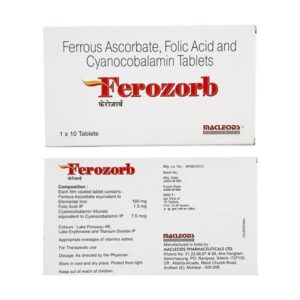FOLIC ACID + FERROUS
Folic Acid: Folic acid is a synthetic form of vitamin B9 that is used to treat or prevent folate deficiency. The medication is essential for the production and maintenance of new cells, such as red blood cells and DNA synthesis, and helps in the proper functioning of the nervous system.
Folic acid works by aiding in the production of red blood cells, supporting the synthesis of DNA, and facilitating the metabolism of amino acids. It also plays a crucial role in preventing neural tube defects during pregnancy.
The recommended dose of folic acid varies depending on the specific condition being treated. For folate deficiency, the usual adult dose ranges from 400 to 800 micrograms per day. During pregnancy, the recommended dose increases to 600 to 800 micrograms per day.
Folic acid is generally well-tolerated, and side effects are rare. However, some individuals may experience mild side effects such as nausea, loss of appetite, and stomach upset. In rare cases, allergic reactions may occur, characterized by rash, itching, swelling, severe dizziness, or difficulty breathing. If any of these side effects occur, it is important to consult a healthcare professional.
It is important to note that folic acid supplementation should be done under the guidance of a healthcare provider, especially during pregnancy or if there is an increased risk of vitamin B12 deficiency. This is because folic acid supplementation can mask symptoms of vitamin B12 deficiency, which, if left untreated, can cause nerve damage.
Ferrous: Ferrous is a drug that contains iron, which is an essential mineral for the body. It is primarily used to treat or prevent iron deficiency, which can lead to conditions like anemia.
The mechanism of action of Ferrous is based on its ability to increase the production of red blood cells and hemoglobin, the substance in red blood cells that carries oxygen. Iron is a crucial component of hemoglobin, and by replenishing iron stores in the body, Ferrous helps in restoring the proper functioning of red blood cells.
The dosage of Ferrous can vary depending on the individual’s age, condition, and severity of iron deficiency. The recommended dose is usually determined by a healthcare professional and is often taken orally as a tablet or liquid. It is important to follow the prescribed dosage and duration of treatment to achieve optimal results.
As with any medication, Ferrous can have potential side effects. Common side effects may include:
1. Gastrointestinal issues: These may include constipation, diarrhea, stomach cramps, nausea, and vomiting. Taking Ferrous with food or adjusting the dosage can help minimize these symptoms.
2. Changes in stool color: Iron supplementation can cause the stool to become dark or black in color. This is a harmless effect and is not a cause for concern.
3. Allergic reactions: Some individuals may experience an allergic reaction to Ferrous, characterized by symptoms like rash, itching, swelling, dizziness, or difficulty breathing. In such cases, immediate medical attention is required.
It is important to note that iron supplements, including Ferrous, should always be taken under the guidance of a healthcare professional. They can assess the need for iron supplementation, adjust the dosage as necessary, and monitor any potential side effects or interactions with other medications.


